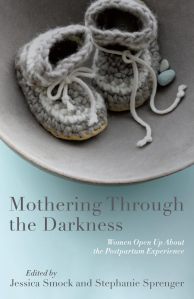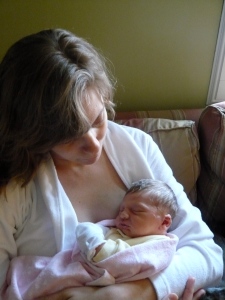Why didn’t anyone tell me this? Is it too much of a buzz kill to mention that possibility in childbirth class?
I’m pretty sure I would’ve benefited from a head’s up.
I was, utterly, unprepared for motherhood.
But that’s pretty much all of us, isn’t it? No matter how many classes we take on birthing a baby, or that useless one about infant care when they teach you how to diaper a doll, we’re all air dropped into a foreign country when it comes to new motherhood.
This November, an essay I wrote about my post partum experience will be published in an anthology aptly titled, Mothering Through the Darkness (She Writes Press, created by the HerStories Project). It’s now available for preorder.
For months I hesitated to write my story, let alone submit it, because I didn’t know if it “counted.” Sure, I had a hard time as a new mom, but I hadn’t been diagnosed with postpartum depression. I hadn’t sought help.
Looking back, it’s clear I needed it. I wonder if I had read some of the essays in this collection, if I would’ve reached out instead of holing up. I don’t know. But I do know that I’m proud to be part of an anthology that broadens the spectrum of postpartum distress.
When I was pregnant I used to watch this ridiculous baby show on TLC called, “Bringing Home Baby.” There was something comforting about watching the new parents return home psyched but frazzled. The cameras followed them as they basically lost their minds.
But they always ended the show the same way, about six or eight weeks later, with everyone looking and sounding like they had gotten their act together. Every now and then I’d catch a glimmer in the mother’s eyes, a primal flash of fear, but then they’d cut to the cute gurgling baby batting at a mobile in her crib or sleeping in a bassinet. All was well. Show over.
But life doesn’t work like a TLC show (thank goodness, really TLC, you have gone downhill). It doesn’t wrap up neatly as the credits roll and the parents take their sweetly reclining baby on a stroll around the block.
Mine certainly didn’t, and I suspect, most don’t.
I still have no idea if I had postpartum depression or postpartum anxiety – an ailment I didn’t even know existed back then. But I do know that new motherhood kicked my ass. Hard.
Do you want to know what I wish I had known? (Hint: It has nothing to do with breastfeeding, vaccinating, sleep training, or any other hot topic parenting topics.)
How completely I would lose myself.
Not temporarily, but forever. The woman who left for the hospital with a baby contracting in her belly did not return that evening. A different person arrived in her place, holding a baby, with aching breasts and a sore battered body.
Perhaps if I had only known about the irretrievable loss of my old self and the necessity of forming a new one, maybe life after birth wouldn’t have felt so bewildering. Maybe.
Of course I’d heard the warnings, the catch all, “Nothing will be the same,” but people said that in relation to physical things, like my body and sleep.
The insinuations were that my life as a mother would be different than my life as a non-mother. I knew there was no going back to my single unattached self, but I assumed I’d slowly collect the pieces of my shattered identity as time went on.
I’d be able to write again, go out at night, visit with friends, and go on vacation with my husband. All this would be returned to me when the baby got older, learned to sleep (ha, try never), or went to school.
But what became apparent as time went on was that there was no milestone that would return me to my old self. I had to forge a new one.
This sentence in the August 2015 edition of Harper’s magazine article, “The Grand Shattering” by Sarah Manguso (author of Ongoingness, a book I just bought) sums it up:
“[Motherhood] is a shattering, a disintegration of the self, after which the original form is quite gone.”
Maybe other women realize this sooner, or maybe this isn’t a lesson everyone needs to learn. I imagine that some women find their way intuitively, or that the new self that motherhood creates is one they fall into like a warm embrace.
In an NPR interview, Jenny Offill, the author of the brilliant book, Dept. of Speculation eloquently states what I felt and continue to feel, which is that the conversation about motherhood is a little narrow.
She explains that when women speak about motherhood, the only other option besides pure bliss seems to be ambivalence. But for the women she knew who had become mothers, it was more complicated than that, “especially for women who had a great passion for some kind of work.”
“They were struggling to bridge the person they used to be with the person they were now, and that maternal love, which is quite fierce can be obliterating of what came before it.”
This line of the interview struck me with such force, as it gave voice to what I had been holding onto for years, the shameful admission that motherhood did not feel like bliss.
I loved my baby and my new life as a mother while simultaneously mourning the loss of my old life and struggling to reconstruct my identity.
I feel as though we are just at the cusp of this conversation about motherhood in the 21st century. I’m grateful to authors like Jenny Offill, Sarah Manguso, and Sarah Ruhl’s, whose book, 100 Essays I Don’t Have Time To Write, inspired my first post on this blog, for shedding light on the many nuances and complexities of modern motherhood.
If you’re a mother, how did you come through the other side? Did you feel the need to start over, or were you able to integrate your new identity in a different way?


